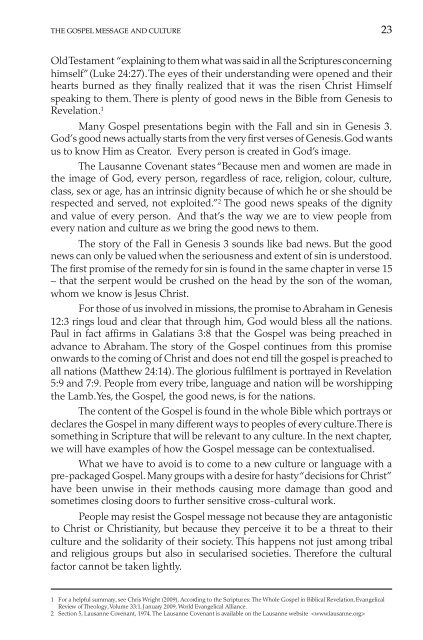WHEN YOU CROSS CULTURES - World Evangelical Alliance
WHEN YOU CROSS CULTURES - World Evangelical Alliance
WHEN YOU CROSS CULTURES - World Evangelical Alliance
Create successful ePaper yourself
Turn your PDF publications into a flip-book with our unique Google optimized e-Paper software.
THE GOSPEL MESSAGE AND CULTURE<br />
Old Testament “explaining to them what was said in all the Scriptures concerning<br />
himself” (Luke 24:27). The eyes of their understanding were opened and their<br />
hearts burned as they finally realized that it was the risen Christ Himself<br />
speaking to them. There is plenty of good news in the Bible from Genesis to<br />
Revelation. 1<br />
Many Gospel presentations begin with the Fall and sin in Genesis 3.<br />
God’s good news actually starts from the very first verses of Genesis. God wants<br />
us to know Him as Creator. Every person is created in God’s image.<br />
The Lausanne Covenant states “Because men and women are made in<br />
the image of God, every person, regardless of race, religion, colour, culture,<br />
class, sex or age, has an intrinsic dignity because of which he or she should be<br />
respected and served, not exploited.” 2 The good news speaks of the dignity<br />
and value of every person. And that’s the way we are to view people from<br />
every nation and culture as we bring the good news to them.<br />
The story of the Fall in Genesis 3 sounds like bad news. But the good<br />
news can only be valued when the seriousness and extent of sin is understood.<br />
The first promise of the remedy for sin is found in the same chapter in verse 15<br />
– that the serpent would be crushed on the head by the son of the woman,<br />
whom we know is Jesus Christ.<br />
For those of us involved in missions, the promise to Abraham in Genesis<br />
12:3 rings loud and clear that through him, God would bless all the nations.<br />
Paul in fact affirms in Galatians 3:8 that the Gospel was being preached in<br />
advance to Abraham. The story of the Gospel continues from this promise<br />
onwards to the coming of Christ and does not end till the gospel is preached to<br />
all nations (Matthew 24:14). The glorious fulfilment is portrayed in Revelation<br />
5:9 and 7:9. People from every tribe, language and nation will be worshipping<br />
the Lamb. Yes, the Gospel, the good news, is for the nations.<br />
The content of the Gospel is found in the whole Bible which portrays or<br />
declares the Gospel in many different ways to peoples of every culture. There is<br />
something in Scripture that will be relevant to any culture. In the next chapter,<br />
we will have examples of how the Gospel message can be contextualised.<br />
What we have to avoid is to come to a new culture or language with a<br />
pre-packaged Gospel. Many groups with a desire for hasty “decisions for Christ”<br />
have been unwise in their methods causing more damage than good and<br />
sometimes closing doors to further sensitive cross-cultural work.<br />
People may resist the Gospel message not because they are antagonistic<br />
to Christ or Christianity, but because they perceive it to be a threat to their<br />
culture and the solidarity of their society. This happens not just among tribal<br />
and religious groups but also in secularised societies. Therefore the cultural<br />
factor cannot be taken lightly.<br />
1 For a helpful summary, see Chris Wright (2009), According to the Scriptures: The Whole Gospel in Biblical Revelation, <strong>Evangelical</strong><br />
Review of Theology, Volume 33:1, January 2009, <strong>World</strong> <strong>Evangelical</strong> <strong>Alliance</strong>.<br />
2 Section 5, Lausanne Covenant, 1974. The Lausanne Covenant is available on the Lausanne website <br />
23

















